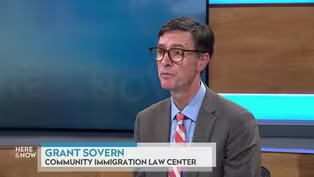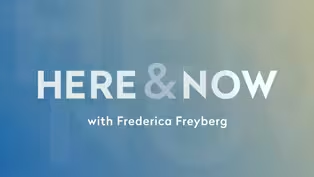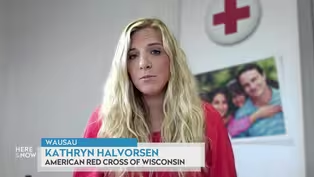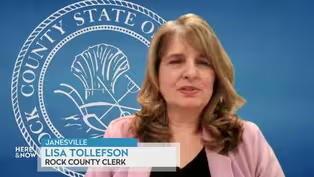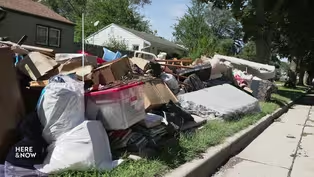Here and Now
Nick Hillman on Borrowing Limits for Federal Student Loans
Clip: Season 2400 Episode 2407 | 5m 54sVideo has Closed Captions
Nick Hillman on the One Big Beautiful Bill Act changing borrowing rules for student loans.
UW-Madison School of Education professor Nick Hillman explains how provisions in the One Big Beautiful Bill Act set lower borrowing limits for medical and law students while changing other loan rules.
Problems playing video? | Closed Captioning Feedback
Problems playing video? | Closed Captioning Feedback
Here and Now is a local public television program presented by PBS Wisconsin
Here and Now
Nick Hillman on Borrowing Limits for Federal Student Loans
Clip: Season 2400 Episode 2407 | 5m 54sVideo has Closed Captions
UW-Madison School of Education professor Nick Hillman explains how provisions in the One Big Beautiful Bill Act set lower borrowing limits for medical and law students while changing other loan rules.
Problems playing video? | Closed Captioning Feedback
How to Watch Here and Now
Here and Now is available to stream on pbs.org and the free PBS App, available on iPhone, Apple TV, Android TV, Android smartphones, Amazon Fire TV, Amazon Fire Tablet, Roku, Samsung Smart TV, and Vizio.
Providing Support for PBS.org
Learn Moreabout PBS online sponsorshipCounty Clerk Lisa Tollefson.
Thank you.
>> Thank you.
>> With Wisconsin trying to tackle a physician shortage, new limits around graduate student federal loans could dissuade some would be doctors from going to medical school at all.
New federal provisions passed as part of the One Big Beautiful Bill act, set lower borrowing limits for medical and law students and eliminate grad Plus loans for what the changes mean for graduates and undergraduates.
Were joined by a specialist in this area, Nick Hillman, professor in the UW-Madison School of Education.
And professor, thanks very much for being here.
>> Of course.
Thank you for the invitation.
>> How big of a sea change is this when it comes to federal student loans?
>> It's significant for two main reasons.
One is that these are now amendments to the Higher Education Act.
So these are now laws.
And a lot of student loan policy has been done through regulations.
And so it's a big sea change because it really galvanizes these changes into legal statutes.
So that's one thing.
Which means it's also going to be harder to change over time.
But the other thing is that it just really shifts the flavor of student loans, how students are going to be interacting with the loan system.
And it brings some simplicities to the system, but it also brings some complexities.
into that a little bit.
But have you heard of medical students say deciding not to attend medical school because of kind of the caps on borrowing?
>> I've heard rumblings of this.
I haven't heard that directly from prospective students, but I have heard concerns in different forums and through different networks about what does this mean for me in terms of how to pay for college?
If loans are less available to me, then I have two options.
I can go and try to find a loan in the private market which might have high interest rates.
Or I can decide maybe I should do something else with my career.
And I think that's the tension that either people are already feeling or they will soon be feeling.
>> So the law also eliminates I understand the grad plus loan.
What will that mean?
>> Well, the Grad Plus loan is pretty significant.
About 17% of all federal student loans are in that program.
And so this is a sizable share of federal student loans.
And if that's no longer available to borrowers, then again, they'll likely go out to the private sector, to banks or to different lenders and take out loans that could be as high as 25% interest rates.
These loans currently have.
The plus loans currently have like 8 or 9% interest rates.
>> Do you know what the justification for all of this was?
>> To save money for the One Big Beautiful Bill act.
I believe it's in the hundreds of billions of dollars.
270 billion is one Congressional Budget Office estimate of how much some of these changes have saved the federal government.
And ultimately, that's the end game here, is to restrict the amount of spending that the federal government does.
>> Back to details.
There were also changes to loan repayments.
Is that significant?
>> That is in a couple of different ways.
So this is what I said earlier about the simplicity and the complexity.
There's some things that I think are pretty popular about the new repayment options for borrowers.
There is now basically just two different options that borrowers can have starting in 2026.
They could do a standard repayment plan that's pegged to how much they borrowed, and then they could do a repayment assistance plan that's pegged to how much they earn.
And so in either of those cases, the idea is to have loan repayment be more sensitive to borrowers economic circumstances.
However, there are some details that also make it more difficult and even potentially punitive for some of the lowest income borrowers.
>> Interestingly, also, there's new accountability standards for undergraduates.
What's that?
>> There are.
And this is something that's really much on my radar is essentially a bachelor's degree recipient, has to earn more than a high school graduate at some point in their future.
And that by itself doesn't seem very problematic.
That's kind of the whole point of education is to boost your economic well-being.
But there are a lot of majors and academic programs where the gap between a high school graduate and a college graduate are not that large.
And so these accountability measures are going to starting in 2026, they're going to start to identify what academic universities across the country are showing that positive return above a high school graduate.
And I worry that maybe it's not this year, maybe it's not next year.
But at some point down the road, a lot of programs that produce graduates who go into public sector and nonprofit work that tend to have low wages are going to be either penalized by being with, you know, withheld federal funds.
Or colleges might just say, we're not going to do this.
It's too risky to run this program anymore.
>> Lastly, do you think that student borrowers know about these changes?
>> No, I think there's a lot of confusion.
And one of the big struggles that I see and I'm hearing about is the timeline of all of these changes are supposed to be taking place July 1st, 2026.
That's ten months away.
And so prospective students, current students, and current borrowers are all wondering.
There's already been several years of a lot of miscommunication, confusion and misunderstanding about the student loan system.
And I'm worried, especially as the federal government of Education has laid off at least 50% of staff at the Department of Education.
I'm very concerned about how this will be implemented and how well it will be implemented.
Grant Sovern on Immigration Arrests, Detentions in Wisconsin
Video has Closed Captions
Clip: S2400 Ep2407 | 7m 1s | Grant Sovern on immigration arrests in Wisconsin are more counties assist federal agents. (7m 1s)
Here & Now opening for August 22, 2025
Video has Closed Captions
Clip: S2400 Ep2407 | 1m 9s | The introduction to the August 22, 2025 episode of Here & Now. (1m 9s)
Kathryn Halvorsen on The Red Cross and Flooding in Milwaukee
Video has Closed Captions
Clip: S2400 Ep2407 | 4m 17s | Kathryn Halvorsen on Red Cross flood recovery efforts and its call for more volunteers. (4m 17s)
Lisa Tollefson on Mail-In Ballots and Elections in Wisconsin
Video has Closed Captions
Clip: S2400 Ep2407 | 5m 23s | Lisa Tollefson on Wisconsin's local officials working to maintain election security. (5m 23s)
Milwaukee Flood Recovery Efforts Continue During FEMA Visit
Video has Closed Captions
Clip: S2400 Ep2407 | 2m 27s | FEMA assessed flood damage in southeast Wisconsin to determine potential federal aid. (2m 27s)
Providing Support for PBS.org
Learn Moreabout PBS online sponsorship
- News and Public Affairs

Top journalists deliver compelling original analysis of the hour's headlines.

- News and Public Affairs

FRONTLINE is investigative journalism that questions, explains and changes our world.












Support for PBS provided by:
Here and Now is a local public television program presented by PBS Wisconsin
